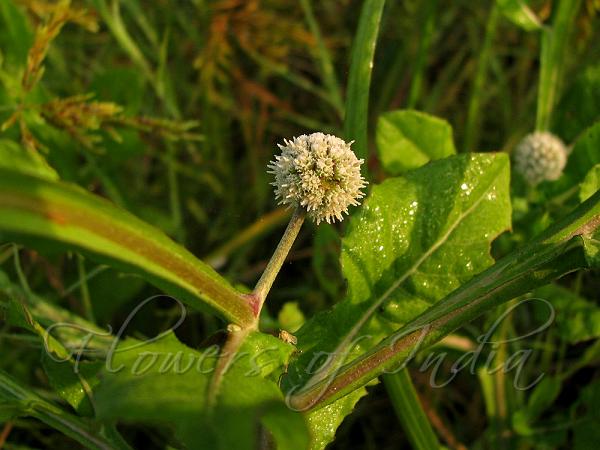|
| African Globe Thistle |
|

|

| File size | 160440 |
| Original date | 9/29/12 7:52 AM |
| Resolution | 1000 x 750 |
| Flash | Flash did not fire, auto |
| Focal length | 6.0mm |
| Exposure time | 1/500s |
| Aperture | 4.0 |
| Focus Distance | |
| Metering Mode | Multi-segment |
| Camera make | Canon |
| Camera model | Canon PowerShot S5 IS |
| Sensor type | OneChipColorArea |
|
|
|
|
Photo: |
Botanical name: Sphaeranthus africanus Family: Asteraceae (Sunflower family)
Synonyms: Sphaeranthus ovalis, Sphaeranthus alatus, Sphaeranthus microcephalus
Synonyms: Sphaeranthus ovalis, Sphaeranthus alatus, Sphaeranthus microcephalus
African Globe Thistle is a plant with 40-50 cm
tall, usually robust stems, which are hairless or velvet-hairy, curved,
ascending, branched, winged, wings entire. Stem leaves are
obovate-oblong, 3-5 cm long, 1.5-2.2 cm wide, velvety or becoming
hairless, base narrowed, tip rounded. Inflorescence consists of
clusters of white globose or ovoid flower-heads about 8 mm in diameter.
Flower-heads are carried on hairless, winged stalks. Bracts are
slender, long-pointed. Flower-head cup is bell-shaped, about 3 x 2.5
mm. Involucre is about 3 x 2.5 mm, phyllaries subequal, oblanceolate,
glabrous or only outermost ones abaxially glandular. Receptacle is
naked. Marginal florets are numerous, corolla tubular, about 1.5 mm,
style tip blunt. Central florets are about 3; corolla about 1.5 mm,
5-toothed, base of anthers entire, filaments dilated, glabrous; style
cylindric, shortly bifid. Achenes cylindric, ca. 1 mm, gland-dotted,
without pappus. African Globe Thistle is found in tropical Africa, and
Asia throughout Malaya to Australia.
Flowering: December-May.
Medicinal uses:  In Ayurveda, the plant is believed to pacify vitiated vata, pitta
epilepsy, migraine, jaundice, fever, cough, hemorrhoids, helminthiasis,
skin diseases and as nervine tonic.
In Ayurveda, the plant is believed to pacify vitiated vata, pitta
epilepsy, migraine, jaundice, fever, cough, hemorrhoids, helminthiasis,
skin diseases and as nervine tonic.
 In Ayurveda, the plant is believed to pacify vitiated vata, pitta
epilepsy, migraine, jaundice, fever, cough, hemorrhoids, helminthiasis,
skin diseases and as nervine tonic.
In Ayurveda, the plant is believed to pacify vitiated vata, pitta
epilepsy, migraine, jaundice, fever, cough, hemorrhoids, helminthiasis,
skin diseases and as nervine tonic. Identification credit: Shrikant Ingalhalikar
| Photographed at Mankhurd, Mumbai. |